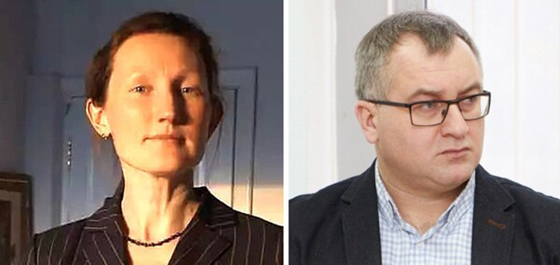Accused of disseminating ‘extremist literature’, forced to relocate its offices abroad, and subjected to intimidation up to and including arrests the independent Belarusian book publishing industry is in danger of disappearing. Publishers are appealing to their foreign colleagues: help us to survive. In the crosshairs of Alexander Lukashenko’s regime is not only freedom of thought, but also, according to the publishers, the Belarusian language. And thus the identity of a people ruled by what has been called ‘Europe’s last dictator’, whose grip on the country has tightened since the suppression of the post-election protests and later with the start of the war in Ukraine and full support for Putin’s Russian regime.
The appeal was made by publishers Valiancina Andrejeva and Andrej Yanushkevich at the General Assembly of the European Federation of Publishers (FEP) in Vilnius last June.
Valiancina Andrejeva is the editor-in-chief of Gutenberg Publishing House and Andrej Yanushkevich is the director of Andrey Yanushkevich Publishing House, two of the largest publishers in the Belarusian language. Neither publishing house, however, is based in the country: the former operates from Krakow, Poland, while the latter moved to Warsaw in 2022 from Minsk, where it was founded. To date, only two independent publishers of books in Belarusian are active in the country. All the others were forced to close down or move abroad”, explains Andrejeva. So far, Belarusian publishers are operating, or trying to operate, from Poland, the Czech Republic, Lithuania and the UK. They try because their books are stigmatised by the regime, considered suspect. Those who own them, those who try to sell them, risk imprisonment.

Let us take a step back for a better understanding. Until 2021-2022, Andrejeva and Yanushkevich explain, three different types of publishing houses operated on Belarusian territory: regime publishing, whose objective was to propagate the state ideology, independent publishing, whose mission was to preserve and disseminate the Belarusian language and culture, and Russian publishers, in Russian, who de facto dominated the market thanks to their strong grip on the distribution sector. Until then, the regime showed no interest in the development of an independent national publishing industry, although it was able to operate with some freedom. After the 2020 elections, the protests and the repression, the picture changed: independent publishing became one of the channels through which dissent was expressed and was therefore increasingly targeted by the regime. Offices were raided in search of ‘extremist literature’, the bank accounts of several publishers were frozen, and publishing licenses were suspended.
The most notorious and serious case is that of Andrei Yanushkevich himself, who is on this year’s shortlist for the Prix Voltaire 2024, the prize promoted by the International Publishers Association (IPA) to recognise and support publishers, organisations and individuals who have distinguished themselves for their commitment to the protection and practice of freedom of publishing and expression. In an article published by the Bookseller in January, ‘How censorship wins’, the publisher itself tells its story: it was founded in 2014 with the aim of publishing historical non-fiction. After 2017, the publisher realised that it had to diversify in order to survive and expanded into fiction, children’s books and texts in translation.
These were years of growth until 2022, the year of the invasion of Ukraine. That year, the publishing house lost its premises: “We were kicked out in three days”. Not giving up, they decided to open a bookshop in Minsk. On the day of the opening, 16 May 2022, inspectors from the Hubazik, the police force in charge of fighting organised crime and corruption, raided the bookshop and, on the basis of a court order, confiscated 15 titles, mostly historical non-fiction by Belarusian authors, but also some children’s and youth books. Among the books confiscated was ‘The Ballad of the Little Tugboat’ by Nobel Prize winner Iosif Brodsky. This was just the beginning: the publisher and bookseller were later arrested, along with his employee Nasta Karnatskaya. The former spent 28 days behind bars, the latter 23. Then, when a book published years earlier, ‘Dogs of Europe’ by Alhierd Bachareviĉ, whose stage adaptation had been performed all over the world, was blacklisted by the regime as ‘extremist material’ whose distribution was forbidden, Yanushkevich decided it was too dangerous to stay in Minsk and moved to Poland.
History proved him right: in January 2023, his publishing house was stripped of its license to publish. Other publishers suffered similar treatment: Haliyafi is forced to declare bankruptcy, Knihazbor is forced to close. Yanushkevich still has a license to distribute in Belarus, ‘but there is a black mark on me’, he says. No one wants to risk prison to sell their books. This happens when society is ruled by absolute fear.
Bookshop inspections are today the norm. A man from Kobryn, a village in the west of the country, was detained for ten days for ‘spreading extremism’: in his flat, on the shelves of his bookshop, was a collection of novels by the Belarusian writer Uladzimer Arlou titled ‘Belarus: An Illustrated History’.
Today, Belarusian independent publishing is a persecuted publishing industry, in exile, but one that does not want to give up. The Belarusian Book Institute (instbelknig@gmail.com), based in Warsaw, is helping publishers to survive and can be contacted to invite authors, publishers and artists to participate in Book fairs or other projects. The Belarusian Book Institute will be taking part in upcoming international fairs, including the Frankfurt Book Fair, and is pursuing initiatives to create new links between these publishers and the rest of Europe, which is often reluctant to negotiate rights sales with publishers who are wrongly seen as associated with a regime they are fighting. “All publishers can help us”, explains Andrejeva, “by facilitating and encouraging the exchange of rights and translations to and from Belarus. Come to our stand in Frankfurt, find out about the most popular books, and consider including them in your catalogues for years to come”.
This article was originally published in the digital edition of the Giornale della Libreria.
 By
By 

















